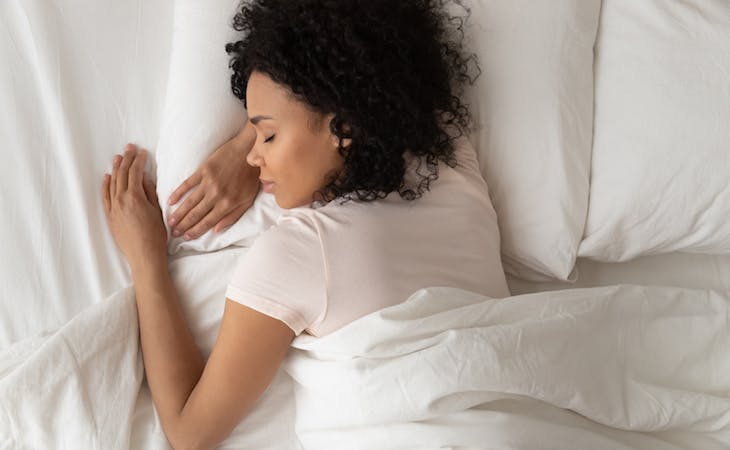Deep sleep, the most restorative form of sleep, happens when the brain slows down during sleep. Unlike REM sleep, which is characterized by brain activity and dreaming, deep sleep slows bodily functions like heartbeat, breathing, and eye movement.
Deep sleep is important for your overall health and well-being—it’s when your brain restores itself, consolidates memories, and recovers from daily activities.
We’re here to tell you exactly what deep sleep is and how to get more of it.
What is deep sleep and why is it so important?
Deep sleep is an important part of our nightly sleep cycle. It’s when your body repairs tissue, detoxifies itself, and builds energy for the next day. The release of growth hormones also happens during deep sleep, making it especially important for children and young adults.
REM vs. Non-REM sleep
A good night’s sleep is broken up into two categories, NREM (non-rapid eye movement) and REM (rapid eye movement). REM sleep accounts for 25% of the night. This is when your brain activity is high and you’re easily woken up.
Non-REM sleep accounts for the other 75% of the night and includes deep sleep. Non-REM sleep is commonly known as “slow-wave sleep” because brain waves are relatively slower than in REM sleep. You’re the most difficult to wake up during this stage.
Top tips for getting more deep sleep throughout the night
The best way to get more deep sleep is to make sure you’re getting enough sleep in general. But, if you still feel like you’re not feeling the benefits of deep sleep, you may need to try something else.
If you’re clocking eight hours a night and finding it hard to wake up during the day, these tips may help you regulate your circadian rhythm and get more high-quality deep sleep.
Tire yourself out
Every minute you’re awake, your body produces a human growth hormone called adenosine. When enough adenosine builds up, your brain shuts off its wake-promoting areas. That’s why it’s important to build up enough sleep pressure” to want to fall asleep every night.
Two things standing in adenosine’s way: caffeine, which hides the hormone from the brain, and napping, which decreases adenosine levels in the body. So if you think you’re lacking shut-eye, try cutting back on both.
Exercise is another great way to tire yourself out. You usually need a little bit more R&R after exercise, which means your body might produce more growth hormone, as it tends to be released at higher levels during deep sleep.
Wind down
It’s easy to work late, get sucked into a new Netflix series, or go straight from a busy day to bed—but taking a warm bath or reading a book for a few minutes before bed can help your body enter sleep more easily.
Additionally, it may be helpful to set a sleep schedule for yourself so your body gets used to winding down at the same time every night. Keeping a bedtime routine will set a natural alarm clock, making it easier to fall asleep at night and wake up in the morning.
Sleep medicine like melatonin supplements can also help you feel more tired. Always talk to your doctor before adding a new supplement to your routine.
Relax your body
One reason why people don’t get a great amount of sleep is because of pain. Spending a bit of time stretching or doing yoga before bed can help relax your body, relieve pain in your lower back, and help you sleep more easily.
To reap even more benefits, incorporate a short meditation, which could help promote more restful and deep sleep.
Make your bedroom a place for sleeping
A lot of people take their phones to bed or sit in bed watching TV or reading. People who tend to fall asleep with the TV on or their cell phone in hand will likely get a light sleep compared to someone going without them. The blue light from the screens tends to keep people awake for longer and can lead to a low amount of deep sleep during the night.
Moreover, if you take these “awake” activities out of the bedroom, your body will start to subconsciously view the bedroom as a place for sleeping. So, when you do go to bed, your body will already be preparing itself for sleep, making it more likely you’ll experience deep sleep.
Stop trying hard to sleep
Simply closing your eyes without worrying about whether or not you’re going to fall asleep could help you find rest more easily. You need to allow your body to wind down, but if your brain is worrying about falling asleep, you probably won’t get a great night of it.
If you keep worrying about falling asleep, a white noise machine may help give your mind something else to focus on and ease the anxiety you feel at night.
Make sure your mattress is the right fit for you
A high-quality mattress can help improve both your sleep quality and deep sleeping. If you wake up tired and achy, a new mattress might be exactly what you need to get better sleep. When shopping for a new mattress, be sure to do your research on the best firmness level for your typical sleeping position.
Frequently asked questions about deep sleep
Curious about what happens if you don’t get enough deep sleep or how to tell if you really are getting enough? we’re answering your most commonly asked questions here.
What happens if you don’t get enough deep sleep?
A lack of deep sleep can eventually lead to sleep deprivation, which, over time, can lead to a greater risk of heart disease, heart attack, high blood pressure, stroke, Alzheimer’s disease, and diabetes.
How do you know if you’re getting enough deep sleep?
There are a few sleep-tracking apps you can download to see exactly how much deep sleep you’re getting. A few things they may look at are:
- Your heart rate
- Your total sleep time
- Your body temperature
These factors can often help sleep trackers decipher what stage of sleep you’re in. You can also usually tell if you didn’t get enough deep sleep based on how you feel when you wake up. If you have low energy, that may be an indicator you didn’t get enough deep sleep.
How much deep sleep do you need?
According to the American Sleep Association, the average adult should be getting between one and a half hours to two and a half hours of deep sleep every night.
As you get older, you spend less time in deep sleep. Why? One thought is that deep sleep is where growth hormones are released—so it makes sense you’d spend less time there as you age.
The time you do spend in deep sleep is important in helping repair your body and gather energy for the next day. Who doesn’t like feeling rejuvenated after a great sleep?
Is too much deep sleep bad?
While it’s certainly possible you’re not getting enough, you can never get too much deep sleep. So if you’re freaking out about your sleep tracker telling you you got 4.5 hours of deep sleep last night, don’t worry.
There’s no real way to get too much deep sleep. Your body has its own natural drive, so once you get the optimal amount of deep sleep for you, you’ll simply start going into REM and light sleep.
Getting a high-quality mattress to achieve deep sleep
If you’re looking to increase deep sleep at night, you’ll need to consider which type of mattress is good for you and your sleeping habits.
Luckily, Saatva has a quick and easy online mattress quiz that will show you exactly what type of mattress is perfect for you. Check out our large selection of mattresses, bed frames, and accessories to find your ideal sleep setup.







